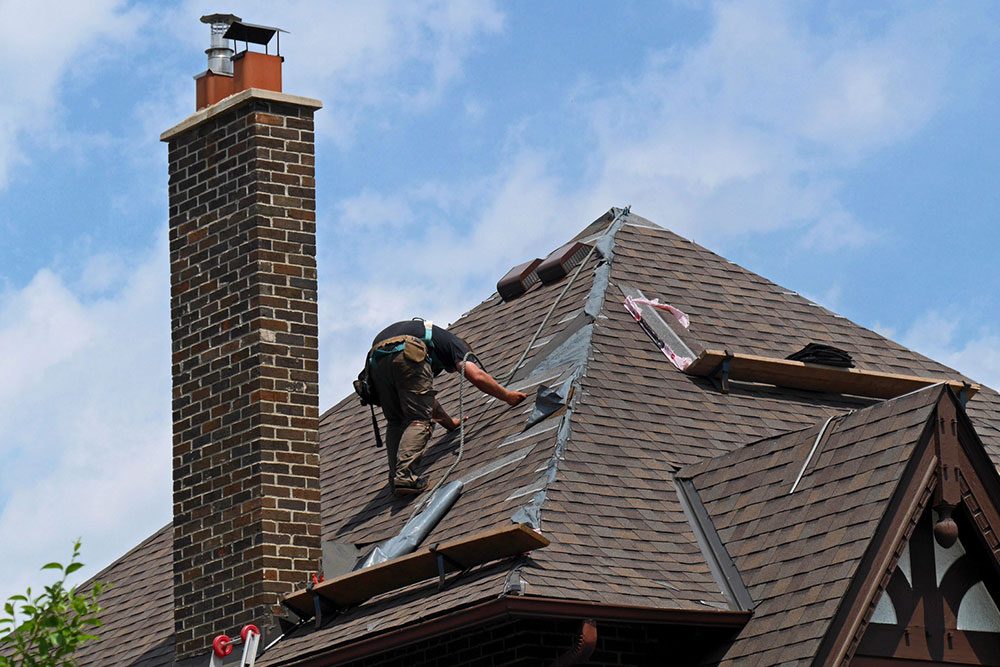Important Things to Consider While Repairing a Roof
The roof is one of the most crucial elements of a house, protecting its occupants from sun, rain, hail, and snow and keeping the home dry. Like everything else, the roof can also undergo damage and wear and tear, leading to leaks and other problems. Since renovating the entire roof at every turn can be expensive, many homeowners turn to smaller DIY or professional roof repairs to manage these costs.

Signs that a roof is damaged
While roof repair can be part of major home renovations, it is often undertaken when there are leaks, mold growth, or other issues. While a dripping roof is an obvious sign that demands repair work, other signs may also indicate the same, which include-
- Visible damage to shingles (holes, missing granules, and tears)
- Moss buildup in the roof valley
- Water stains in the ceiling and attic
- Pooling water on the roof
- Ice dams
- Noticeable sagging
- Increased energy bills (not due to HVAC issues)
- Clogged gutters
Trying DIY roof repair
Depending on the severity of the damage, one can opt for DIY repairs to save costs. For this, homeowners must start by evaluating the damage and gathering the necessary tools. These may include gloves, eye protection, a ladder, shingles, flashing, roofing cement, a hammer, nails, a pry bar, a roofing knife, sealant, a patch kit, a tarp, etc.
Before taking on a repair project, one must wear all the recommended safety gear to reduce the risk of accidents. Use the right techniques (as suggested by the manufacturer) to fix the damage. If it looks too extensive, hire a professional roofing company to repair it.
Cost of professional roof repair
Roof repair costs are contingent on various factors, such as the following-
- Repair type- The degree of damage is one of the first factors to consider when calculating the total cost of repairs. Smaller patching projects will be cheaper than larger and more complex repairs.
Here’s a breakdown of what one could expect to pay, depending on the level of damage-
- On average, professional services may charge between $150 and $1000 for minor repairs, such as small roof leaks, minimal shingle replacements, and/or punctures.
- For moderate damage, such as limited water damage, flashing replacements, and felt/decking repairs, homeowners may have to pay between $1000 and $2000.
- For large repairs, such as those involving a sagging roof that needs partial or extensive replacement, roofers may charge between $2000 and $8000.
- Material- The type of material used to make the roof (such as asphalt or composite shingles, slate roofs, metal, etc.) plays a huge role in determining the overall cost of repairs. In addition to the cost of the material itself, some roofing materials are notoriously difficult to work with, further driving up the costs.
Flat roofing materials, such as rubber, PVC, etc., tend to be the cheapest when it comes to repairs, while concrete tiles are the most expensive.
- Roof features- The damage could have occurred in any part of the roof, structural or surface level. Structural damages, such as to the rafters/trusses, collar beams, or sheathing, are likely to be much more expensive than other repairs.
- Pitch/design- The design of the roof also plays an important role in determining the overall cost of repairs. Roofs that are difficult to access are usually more dangerous to repair, causing a significant jump in restoration costs.
- Location- The cost of living and transportation in one’s area can also impact the cost of roof repairs. Prices are usually higher in urban or metropolitan areas than in smaller towns.
Choosing the right roof repair services
Here are some things to consider when choosing a professional roofing contractor to ensure the best possible care for one’s roof-
- Check out reviews- To choose the best roofing contractor for repairs, read online reviews for all contractors in the area from the past 3-6 months. This will give homeowners an idea about the quality of work to expect from the roofing contractor.
- Look for local contractors- It is wise to hire local repair companies as they are up to date on the local code and paperwork, ensuring the right kind of work. To find one nearby, search “roof repair near me” online and check the listings.
- Speak to multiple contractors- Instead of choosing the first contractor one finds, talk to a few different companies or professionals and compare quotes before picking one. Note that these estimates must include details, including the prices of roofing components, labor, and clean-up fees. Any hidden fees, fine print, or lack of warranty details indicate a red flag.
- Seek quality over price- For homeowners, going for the cheapest option may seem tempting, but it can lead to problems in the long run. To avoid any potential issues, prioritize factors like the quality of work and materials used by the contractor to fix the roof.
Ways to save costs on repairs
Taking good care of the roof can help homeowners save significantly on repair costs in the future. Here are some tips to help one achieve the same-
- Inspect the roof at least twice a year (especially after storms)
- Check if homeowners insurance will cover repairs after a disaster.
- During rainy or snowy seasons, it is important to fix minor leaks without delay. A professional can inspect the roof during the dry months to limit damage.
- Understand the roof system and its various components to make informed decisions.
- Several local, state, and federal rebates are available for repairs of certain cool roofing materials, so keep an eye out for these.